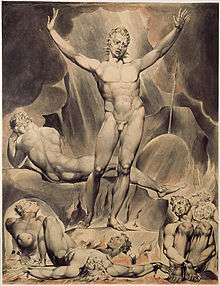
Conrad II of Italy
Conrad II (12 February 1074 – 27 July 1101) was the Duke of Lower Lorraine (1076–87), King of Germany (1087–98) and King of Italy (1093–98). He was the second son of Holy Roman Emperor Henry IV and Bertha of Savoy, and their eldest son to reach adulthood, his older brother Henry having been born and died in the same month of August 1071. Conrad's rule in Lorraine and Germany was nominal. He spent most of his life in Italy and there he was king in fact as well as in name.
Childhood
Conrad was born on 12 February 1074 at Hersfeld Abbey while his father was fighting against the Saxon Rebellion. He was baptised in the abbey three days later. After Henry's victory against the Saxons, he arranged for an assembly at Goslar on Christmas Day 1075 to swear an oath recognising Conrad as his successor. After the death of Duke Godfrey IV of Lower Lorraine on 22 February 1076, Henry refused to appoint the late duke's own choice of successor, his nephew, Godfrey of Bouillon, and instead named his two-year-old son Duke of Lower Lorraine. He did appoint Albert III of Namur, the deceased duke's brother-in-law, as his son's vice-duke (vicedux) to perform the daily functions of government. He also allowed the march of Antwerp to pass to Godfrey of Bouillon. The total absence of Conrad from his duchy caused or abetted the decline of ducal authority in it. In 1082, while Conrad was in Italy, the peace of God was introduced into the diocese of Liège.

Conrad (comic strip)
Conrad was a comic strip about "America's favorite frog prince". Written and illustrated by Bill Schorr, the strip was launched November 8, 1982. Syndicated by Tribune Media Services, it had a run for over three years, ending June 7, 1986.
Characters and story
The frog Conrad, needing money to pay his bookie, convinces the fat, dim-witted fairy tale princess that he is an enchanted prince who can be turned into a human by a kiss.
Other characters include the princess' father, the King, who is skeptical that Conrad is a prince, and resident witch Aggie, who grants spells and potions to the princess. Fido, the princess's pet alligator, thinks he is a dog.
More by Schorr
The strip did not catch on and was dropped in the summer of 1986. The award-winning editorial cartoonist Bill Schorr, however, went on to create three more comic strips–The Grizzwells (1987–present), Phoebe's Place (1990-1991) and Lunchbucket (1993, with Rex May).
Books
Two Conrad book collections were published in 1985.
Conrad Sewell
Conrad Ignatius Mario Maximilian Sewell (born 31 March 1988) is an Australian singer and songwriter from Brisbane, Australia who attended St. Laurence's College from 1998 to 2005. Sewell is best known for his vocals on Kygo's single "Firestone" and his number-one single "Start Again". At the ARIA Music Awards of 2015, he won Song of the Year for "Start Again" and it was nominated in two other categories: Breakthrough Artist and Best Pop Release.
Career
Early career
Growing up in Brisbane, Sewell started pursuing a music career from a young age, sending around demos since he was 8 years old. Sewell is the brother of singer Grace, who is best known for her 2015 cover of "You Don't Own Me".
In 2004, Sewell auditioned for season 2 of Australian Idol, but did not pass the audition stage. He later tried his luck with short-lived rock band Sons of Midnight.
He spent years recording songs in garages and working to save money to move to the United Kingdom where pop music was more accepted. At the age of 18, Sewell moved to the U.K. to record a demo.

Satan
Satan (Hebrew: שָּׂטָן satan, meaning "adversary";Arabic: شيطان shaitan, meaning; "astray", "distant", or sometimes "devil") is a figure appearing in the texts of the Abrahamic religions who brings evil and temptation, and is known as the deceiver who leads humanity astray. Some religious groups teach that he originated as an angel who fell out of favor with God, seducing humanity into the ways of sin, and who has power in the fallen world. In the Hebrew Bible and the New Testament, Satan is primarily an accuser and adversary, a decidedly malevolent entity, also called the devil, who possesses demonic qualities.
In Theistic Satanism, Satan is considered a positive force and deity who is either worshipped or revered. In LaVeyan Satanism, Satan is regarded as holding virtuous characteristics.
Judaism
Hebrew Bible
The original Hebrew term satan is a noun from a verb meaning primarily "to obstruct, oppose", as it is found in Numbers 22:22, 1 Samuel 29:4, Psalms 109:6.Ha-Satan is traditionally translated as "the accuser" or "the adversary". The definite article ha- (English: "the") is used to show that this is a title bestowed on a being, versus the name of a being. Thus, this being would be referred to as "the satan".
Satan (disambiguation)
Satan is an embodiment of antagonism, often synonymous with the devil.
The word may also refer to:
In music
Fictional characters
Other uses
See also
Satan (1991 film)
Satan (Russian: Сатана) is a 1991 Soviet thriller film directed by Viktor Aristov. It was entered into the 41st Berlin International Film Festival where it won the Silver Bear - Special Jury Prize.
Cast
References
External links
Voices
Voices may refer to:
Film
In print
In music
Albums
Podcasts:

